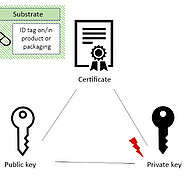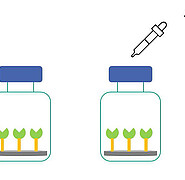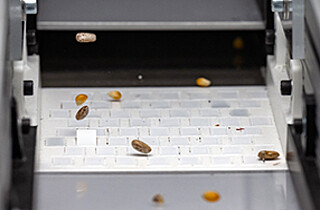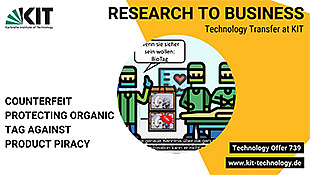Counterfeit protecting organic tag against product piracy

Counterfeit goods cause immense losses every year and endanger consumers, e.g. due to inferior materials. In areas such as medical technology, pharmaceuticals, food and luxury goods, it is crucial to guarantee the authenticity and quality of products without any gaps.
State of the art
Familiar methods such as barcodes or holograms are often inadequate as they can be easily removed or imitated. More sophisticated bio-based marking technologies such as product-specific enzymes or DNA markers, which are intended to increase counterfeit protection, often do not meet all the relevant criteria: Effective markings for authenticity verification must be complex, tamper-proof and firmly attached to the product. Ideally, they should also be invisible, non-toxic and verifiable without costly technology.
Technology
Researchers at the wbk Institute of Production Engineering and the Institute of Bio- and Food Technology (MAB-BLT) at KIT have succeeded in producing an enzyme-based authentication protection with very high counterfeit protection, the “bio-tag”. It is flexible and can be used for various materials from solids to liquids. The Bio-Tag consists of an enzyme that is inseparably attached to a product. As the enzymes are firmly and covalently bound to the product via a linker, i.e. a bifunctional molecule, the tag cannot be removed non-destructively. To check the authenticity, the tester applies a special liquid (substrate) to the product. A visible color change occurs in the original product; in the case of counterfeits, the tag remains unchanged without an optical signal. Depending on the product, either the enzyme or the substrate can act as a tag, even for applications at higher temperatures.
Advantages
The Bio-Tag offers extremely high counterfeit protection, as the enzyme cannot be easily analyzed. Several enzymes and substrates can be combined, which makes reproducibility more difficult. The tag can withstand mechanical stress and is temperature-resistant. In addition, authenticity can be easily checked with the naked eye or using a smartphone app, without the need for expensive special equipment.
Options for companies
KIT is looking for application partners from industry who would like to test the technology on their products.
Images close open
Your contact person for this offer

Innovation Manager New Materials and Health Technologies Karlsruhe Institute of Technology (KIT)
Innovation and Relations Management (IRM) Phone: +49 721 608-26107
Email: jan-niklas.bloetz@kit.edu





